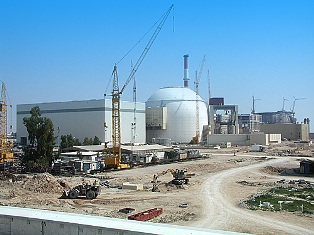Iran draws attention to Bushehr
25 February 2009
Iranian officials assembled the world's press today for a pre-commissioning systems shakedown at the Bushehr nuclear power plant.
 |
Bushehr during construction. The reactor
is now basically complete and work is
focused on pre-commissioning checks
and tests (Image: AtomStroyExport) |
Although widely billed as 'first operation' of the reactor, the unit itself will not be operating - the required uranium fuel for the reactor remaining under International Atomic Energy Agency (IAEA) seal. Instead, the reactor core will be loaded with dummy fuel made of lead.
The real fuel is not expected to be loaded for some weeks, and after that some six months of commissioning checks and tests would be required before the unit is brought to criticality and produces any electricity. That milestone is currently planned for around this time next year.
Sergei Kiriyenko, head of Rosatom, the umbrella organisation for the Russian nuclear industry, told RIA Novosti reporters at the Bushehr site: "We can say the basic construction and assembly work has been completed at the nuclear power plant and we are now switching over to start-up operations." Reporters from the BBC said that Russian technicians in the unit's control room appeared to be working through a program of systems checks, and noted that plastic wrapping remains on many components within the plant.
Bushehr is the most visible component of Iran's nuclear energy program and it is the need to fuel the reactor that Iran says is the purpose of its uranium enrichment program. The country does not yet have any facilities to manufacture actual reactor fuel using its stock of low-enriched uranium.
The world remains concerned by the use of enrichment technology, which could be applied in a program to make bombs, but IAEA inspections have been able to verify that no nuclear material has been diverted in this way. Similarly, there is no concern that the operation of the Bushehr nuclear power plant under IAEA observation would pose a proliferation risk.
Of more concern are certain studies with apparent military links carried out before the enrichment work was publicly known. Iranian officials are refusing to comment productively on documents provided to the IAEA which allegedly indicate a nuclear weapons program at an early stage. Another major roadblock for the IAEA is Iran's refusal to allow it access to a heavy-water reactor under construction at Arak, which will not fall under the safeguards regime until nuclear materials such as uranium are on site.